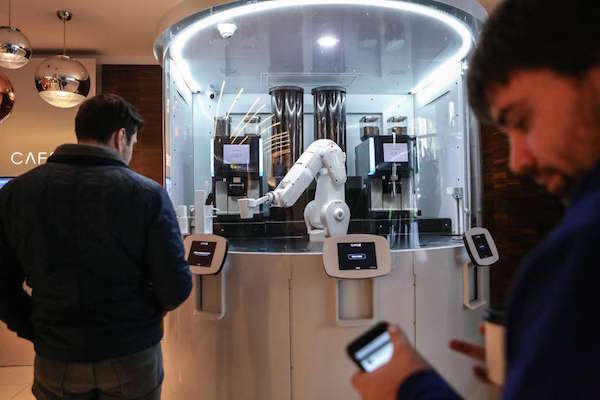
05/05/2017
San Francisco County Supervisor Jane Kim is investigating how a tax on robots might help to mitigate the job destruction of the coming automated workplace, perhaps following the suggestion of Microsoft founder Bill Gates who recommended a few months ago that job-killing robots should be taxed.Is this not an ironic turn of politics? The famously open-borders, criminal-friendly, illegal-alien-welcoming city by the bay is fearful that automation will snatch jobs away from residents. Say! — perhaps San Francisco could enact a special tax on job-stealing illegal aliens for their extra burden on the system. If that’s not too reasonable …
Being a tech hub — and now the northerly extension of Silicon Valley — San Francisco has seen the job-crunching machines up close and personal, including a robot barista, an automated security guard and the “LoweBot” hardware store shopper guides that are already in action.
Below, San Francisco latte guzzlers may now have their brew prepared by a robot coffee machine, a device that endangers the livelihoods of barista workers, both college-educated and not.

San Francisco often wrongly fantasizes itself as being ahead of the rest of the country, but in this case it is actually is debating a problem that Washington is ignoring to the peril of all Americans.
San Francisco is considering a once unthinkable measure to offset the threat of job-killing robots, Business Insider, May 2, 2017
The tech industry collectively face-palmed when Trumps treasury secretary said earlier this year that the threat of robots taking human jobs was not even on our radar screen.
There is a growing evidence that robots and artificial intelligence could displace huge swaths of the American workforce in the next couple of decades, much sooner than the 50 to 100 more years away timeline that Treasury Secretary Steven Mnuchin said he expects.
In San Francisco, where robots already run food deliveries for Yelps Eat24 and make lattés at a mall coffee kiosk, one politician is working to ensure the city stays ahead of the curve.
Supervisor Jane Kim is exploring a tax on robots as one solution to offset the economic devastation a robot-powered workforce might bring. Companies that use robots to perform tasks previously done by humans would pay the city. Those public funds might be used to help retrain workers who lose their jobs to robots or to finance a basic income initiative.
Kim, one of 11 city supervisors in San Francisco, has been interviewing tech leaders, labor groups, and public policy experts in the hopes of creating a task force that will explore how a robot tax might be implemented. San Francisco would become the first city to create such a tax, after European lawmakers rejected a similar proposal in February.
We think that [automation of work] could be one of the bigger — or biggest — policy issues that will face us in, not the next 50 to 100 years, as Mnuchin said, but in the next five to 10 years. And I think that government needs to get ahead of the curve, Kim tells Business Insider.
Kim learned the concept of a robot tax when Bill Gates called for one in an interview with Quartz. It struck a chord with the San Francisco politician, who represents some of the poorest and wealthiest residents across the Tenderloin, South of Market, Civic Center, Treasure Island, and several other neighborhoods. She hears of robots cropping up in hotels, hospitals, and even her local bar, and worries about how automation might deepen the income gap.
A new study from research firm PricewaterhouseCoopers (PwC) estimates 38% of US jobs could be lost to automation by the early 2030s. Jobs that are repetitive and do not require human interaction — like flipping burgers or making deliveries — are likely to be the first to swap out people for robots.
The disruption will hurt low-income earners first, Kim predicts. San Francisco has one of the highest levels of income inequality in the US, according to figures from the Brookings Institute.
Sam Altman, president of startup accelerator Y Combinator, has said automation will bring a change in the economy on the order of the Industrial Revolution or the Agricultural Revolution, where you see a huge amount of human jobs change in a very short period of time.
This is a content archive of VDARE.com, which Letitia James forced off of the Internet using lawfare.